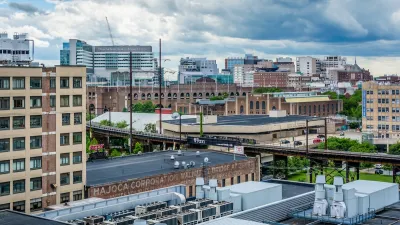The tech industry's push into San Francisco has entailed a fight for political and cultural legitimacy as well as social justice--one that shakes up conventional wisdom about conservatism, progressivism, and progress itself.
The flood of tech companies and their employees--at the end of 2013, San Francisco had 53,000 tech jobs, over triple the number in 2004--has spiked property values and rents: these days, San Francisco's housing is the costliest in the U.S.
That mounting costliness has occasioned massive displacements and lively protests.
The blockades of the "Google" buses have garnered worldwide attention, but it's the less showy city's tenants movement that has become a major force in San Francisco politics.
At the same time, the anti-displacement movement is unsettling assumptions about left and right.
The opponents of displacement, arguing from the left, which customarily identifies itself as the party of progress, are denounced as reactionary and insular--and not just by apologists for big business.
Meanwhile, the tech industry is hailed as the truly progressive force in town.
"This ideological churn," writes Zelda Bronstein, "embodies profound yet elusive shifts in historical consciousness" that are thrown "into high relief" by "the discord roiling San Francisco."
Examining arguments from both sides, Bronstein suggests that we need to rethink the relationship between technological change and democracy--and the meaning of progress.
FULL STORY: "How Silicon Valley Millionaires Stole Progressivism"

Alabama: Trump Terminates Settlements for Black Communities Harmed By Raw Sewage
Trump deemed the landmark civil rights agreement “illegal DEI and environmental justice policy.”

Planetizen Federal Action Tracker
A weekly monitor of how Trump’s orders and actions are impacting planners and planning in America.

Why Should We Subsidize Public Transportation?
Many public transit agencies face financial stress due to rising costs, declining fare revenue, and declining subsidies. Transit advocates must provide a strong business case for increasing public transit funding.

Understanding Road Diets
An explainer from Momentum highlights the advantages of reducing vehicle lanes in favor of more bike, transit, and pedestrian infrastructure.

New California Law Regulates Warehouse Pollution
A new law tightens building and emissions regulations for large distribution warehouses to mitigate air pollution and traffic in surrounding communities.

Phoenix Announces Opening Date for Light Rail Extension
The South Central extension will connect South Phoenix to downtown and other major hubs starting on June 7.
Urban Design for Planners 1: Software Tools
This six-course series explores essential urban design concepts using open source software and equips planners with the tools they need to participate fully in the urban design process.
Planning for Universal Design
Learn the tools for implementing Universal Design in planning regulations.
Caltrans
Smith Gee Studio
Institute for Housing and Urban Development Studies (IHS)
City of Grandview
Harvard GSD Executive Education
Toledo-Lucas County Plan Commissions
Salt Lake City
NYU Wagner Graduate School of Public Service





























